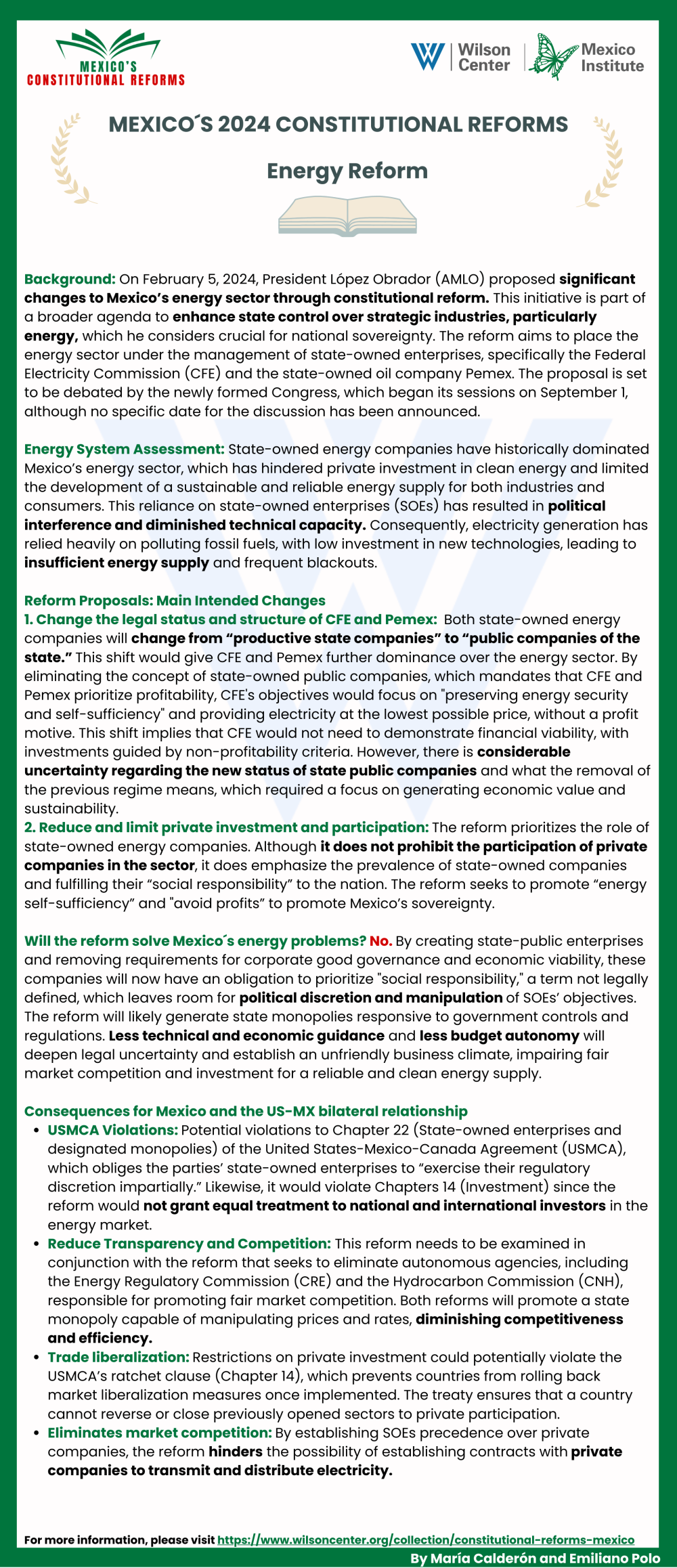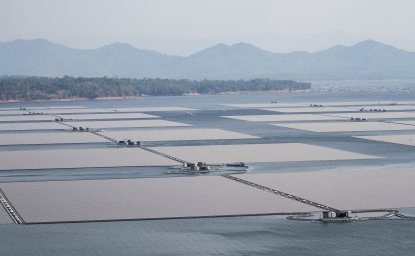
Background: On February 5, 2024, President López Obrador (AMLO) proposed significant changes to Mexico’s energy sector through constitutional reform. This initiative is part of a broader agenda to enhance state control over strategic industries, particularly energy, which he considers crucial for national sovereignty. The reform aims to place the energy sector under the management of state-owned enterprises, specifically the Federal Electricity Commission (CFE) and the state-owned oil company Pemex. The proposal is set to be debated by the newly formed Congress, which began its sessions on September 1, although no specific date for the discussion has been announced.
Energy System Assessment: State-owned energy companies have historically dominated Mexico’s energy sector, which has hindered private investment in clean energy and limited the development of a sustainable and reliable energy supply for both industries and consumers. This reliance on state-owned enterprises (SOEs) has resulted in political interference and diminished technical capacity. Consequently, electricity generation has relied heavily on polluting fossil fuels, with low investment in new technologies, leading to insufficient energy supply and frequent blackouts.
Reform Proposals: Main Intended Changes
1. Change the legal status and structure of CFE and Pemex: Both state-owned energy companies will change from “productive state companies” to “public companies of the state.” This shift would give CFE and Pemex further dominance over the energy sector. By eliminating the concept of state-owned public companies, which mandates that CFE and Pemex prioritize profitability, CFE's objectives would focus on "preserving energy security and self-sufficiency" and providing electricity at the lowest possible price, without a profit motive. This shift implies that CFE would not need to demonstrate financial viability, with investments guided by non-profitability criteria. However, there is considerable uncertainty regarding the new status of state public companies and what the removal of the previous regime means, which required a focus on generating economic value and sustainability.
2. Reduce and limit private investment and participation: The reform prioritizes the role of state-owned energy companies. Although it does not prohibit the participation of private companies in the sector, it does emphasize the prevalence of state-owned companies and fulfilling their “social responsibility” to the nation. The reform seeks to promote “energy self-sufficiency” and "avoid profits” to promote Mexico’s sovereignty.
Will the reform solve Mexico´s energy problems? No. By creating state-public enterprises and removing requirements for corporate good governance and economic viability, these companies will now have an obligation to prioritize "social responsibility," a term not legally defined, which leaves room for political discretion and manipulation of SOEs’ objectives. The reform will likely generate state monopolies responsive to government controls and regulations. Less technical and economic guidance and less budget autonomy will deepen legal uncertainty and establish an unfriendly business climate, impairing fair market competition and investment for a reliable and clean energy supply.
Consequences for Mexico and the US-MX bilateral relationship
- USMCA Violations: Potential violations to Chapter 22 (State-owned enterprises and designated monopolies) of the United States-Mexico-Canada Agreement (USMCA), which obliges the parties’ state-owned enterprises to “exercise their regulatory discretion impartially.” Likewise, it would violate Chapters 14 (Investment) since the reform would not grant equal treatment to national and international investors in the energy market.
- Reduce Transparency and Competition: This reform needs to be examined in conjunction with the reform that seeks to eliminate autonomous agencies, including the Energy Regulatory Commission (CRE) and the Hydrocarbon Commission (CNH), responsible for promoting fair market competition. Both reforms will promote a state monopoly capable of manipulating prices and rates, diminishing competitiveness and efficiency.
- Trade liberalization: Restrictions on private investment could potentially violate the USMCA’s ratchet clause (Chapter 14), which prevents countries from rolling back market liberalization measures once implemented. The treaty ensures that a country cannot reverse or close previously opened sectors to private participation.
- Eliminates market competition: By establishing SOEs precedence over private companies, the reform hinders the possibility of establishing contracts with private companies to transmit and distribute electricity.
Authors





